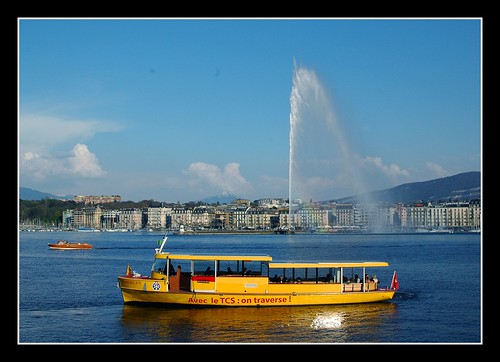 Geneva (Photo credit: Alan M Hughes)[/caption]
Geneva (Photo credit: Alan M Hughes)[/caption]The Geneva Conference (April 26 – July 20, 1954[1]) was a conference which took place in Geneva, Switzerland, whose purpose was to attempt to find a way to unify Vietnam and discuss the possibility of restoring peace in Indochina.[2] The Soviet Union, the United States, France, the United Kingdom, and the People’s Republic of China were participants throughout the whole conference while different countries concerned with the two questions were also represented during the discussion of their respective questions,[3] which included the countries that sent troops through the United Nations to the Korean War and the various countries that ended the First Indochina War between France and the Việt Minh. The part of the conference on the Korean question ended without adopting any declarations or proposals. Some participants and analysts blamed the US for having obstructed movements towards the unification of Korea as a communist state.[3][4][5] On Indochina, the conference produced a set of documents known as the Geneva Accords. These agreements separated Vietnam into two zones, a northern zone to be governed by the Viet Minh, and a southern zone to be governed by the State of Vietnam, then headed by former emperor Bảo Đại. A "Conference Final Declaration", issued by the British chairman of the conference, provided that a "general election" be held by July 1956 to create a unified Vietnamese state. Although presented as a consensus view, this document was not accepted by the delegates of either South Vietnam or the United States. In addition, three separate ceasefire accords, covering Cambodia, Laos, and Vietnam, were signed at the conference
Korea
Main article: Korean War
The armistice signed at end of the Korean War required a political conference within three months—a timeline which was not met—“to settle through negotiation the questions of the withdrawal of all foreign forces from Korea, the peaceful settlement of the Korean question, etc.”[6]
[edit]Indochina
Main article: First Indochina War

Geneva Conference
After the defeat of the Japanese Empire in 1945, the Provisional Government of the French Republic restored colonial rule in French Indochina. Nationalist and communist movements in Vietnam led to the First Indochina War in 1946. This colonial war between the French Union's Expeditionary Corps and Hồ Chí Minh's Việt Minh guerrillas turned into a Cold War crisis in January 1950.[7] The communist Việt Minh received support from the newly proclaimed People's Republic of China and the Soviet Union, while France and the newly created Vietnamese National Army received support from the United States.
The Battle of Điện Biên Phủ started on March 13, 1954 and continued during the conference. Its issue became a strategic turnover as both sides wanted to emerge as the victor and forge a favorable position for the planned negotiations about “the Indochinese problem”. After fighting for 55 days, the besieged French garrison was overrun and all French central positions were captured by the Việt Minh.
This war was significant in that it starkly demonstrated the reality that a Western colonial power could be defeated by an indigenous revolutionary force; the French previously pacified a similar uprising in the Madagascar colony in March, 1947. A few months after the fall of Điện Biên Phủ, troops were deployed in Algeria and a second guerrilla-warfare-based war of independence started in November 1954. Growing distrust and defiance among the army's Chief of Staff toward the Fourth French Republic after the contested defeat of the First Indochina War led to two military coups d'état in March 1958 and April 1961. Most of the rebel generals were Indochina veterans, including their leader, Raoul Salan.
On the Korean question
The South Korean representative proposed that the South Korean government was the only legal government in Korea, that UN-supervised elections should be held in the North, that Chinese forces should withdraw, and that UN forces—a belligerent party to the war—should remain as a police force. The North Korean representative suggested that elections be held throughout all of Korea, that all foreign forces leave beforehand, that the elections be run by an all-Korean Commission that is made up of equal parts from North and South Korea, and to generally increase relations economically and culturally between the North and the South. The Chinese delegation proposed an amendment to have a group of “neutral nations” supervise the elections, which the North accepted. The U.S. supported the South Korean position and saying that the USSR wanted to turn North Korea into a puppet state. Most allies remained silent and at least one, Britain, thought that the U.S.-South Korean proposal would be deemed unreasonable. The South Korean representative then made a new proposal where there would be all-Korea elections but that they would be held according to South Korean constitutional procedures and still under UN-supervision. On June 15, the last day of the conference on the Korean question, the USSR and China both submitted declarations in support of a unified, democratic, independent Korea, and that negotiations to that end should resume at an appropriate time. The Belgian and British delegations said that while they were not going to accept “the Soviet and Chinese proposals, that did not mean a rejection of the ideas they contained.”In the end, however, no declaration was adopted. Some participants and analysts suggest that the U.S. obstructed efforts towards a peace agreement.Korea remains divided to this day.
Source
Creative Commons Attribution-ShareAlike License

No comments:
Post a Comment